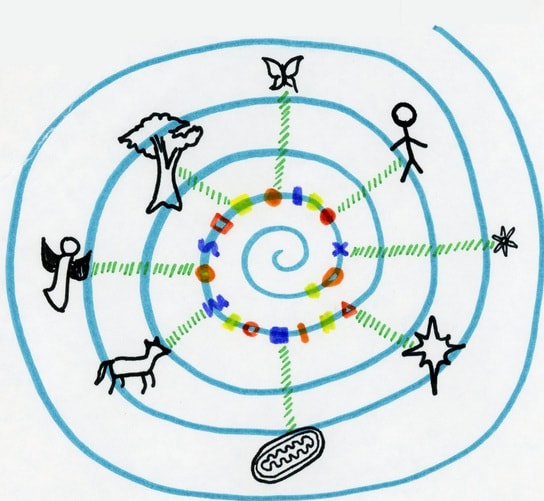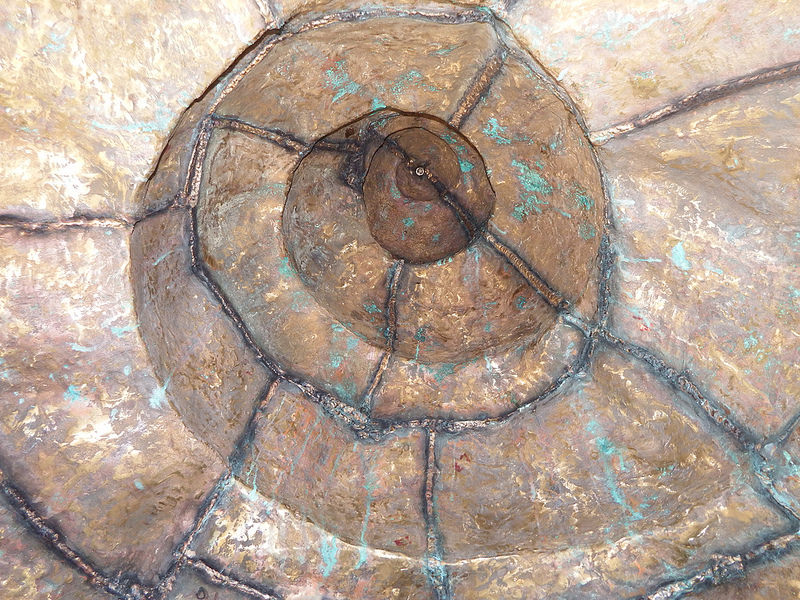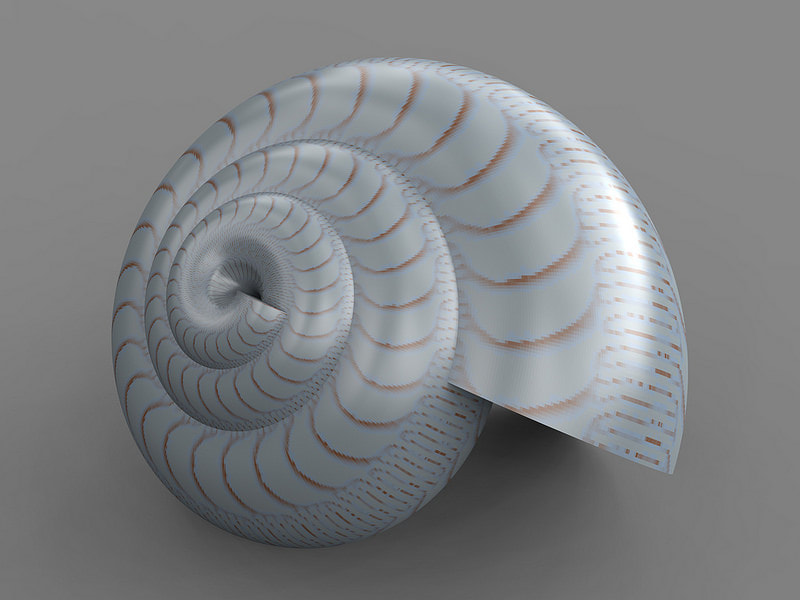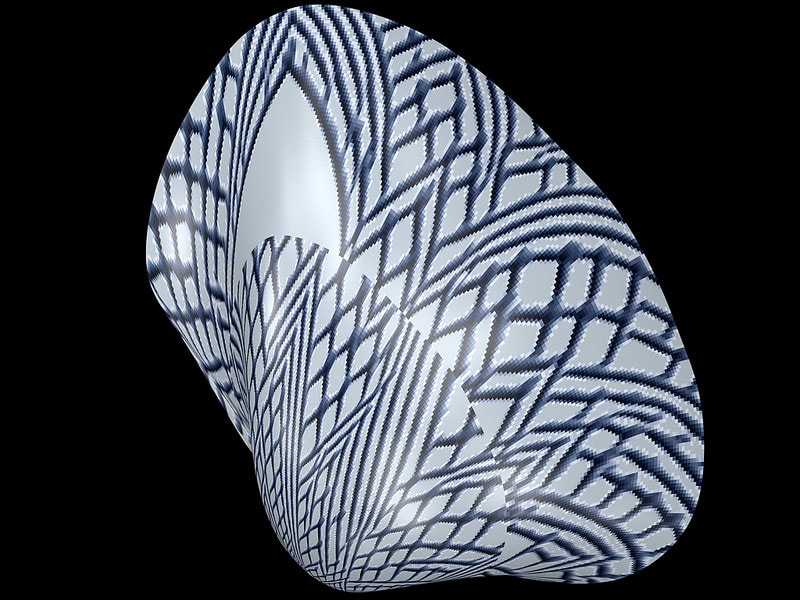Whitehead's Idea of God
by Jay McDaniel
with help from an image created by Rachel Ribondo-Gros
|
Everything is Inside God
God is the spiral. The spiral has no boundaries, no end point. We can never draw a circle around God and say that God is inside the circle, whereas other things are outside the circle. God has no inside or outside. This means that there is nothing outside God. However, this does not mean that all things are mere manifestations of God, as if God is a lonely cosmic dancer and the world is God's dance. If we imagine God dancing, we best imagine God as having partners with independence of their own: the people and the butterflies, the angels and the atoms, the galaxies and the stars. But these partners are not outside God, they are inside God's own life. So various metaphors must be explored. God as the Living Whole Yes, in one sense the people and butterflies are like partners in a dance, with God as the lead dancer. God is trying to guide them into forms of dancing that are beautiful, joyous, and mutually enriching. But God's power is not absolute. What happens in the dance as a whole is an outcome of divine creativity and the universe's creativity, not divine creativity alone. Process thinkers call this the co-creativity of God and the Universe. Co-creativity can result in tragedy as well as joy, horror as well as beauty. In process theology God, understood as the lead dancer, is always trying to guide the world into joy and beauty, not tragedy and horror. God is good. But the dance metaphor is problematic, inasmuch as it depicts the universe as outside God's life. For process thinkers the universe is not outside God but rather inside God, not unlike a baby is within a mother's womb. The dance of the universe, partly determined by creatures in the universe, is like the moving of a baby within the womb. As the baby kicks, the mother feels it and in some sense it happens to her, too. The New Testament puts it this way: we "live and move and have our being in God." (Acts 17:28) When we walk on a beach on a starry night, look up at the sky and feel small but included, we are gazing into a living whole which is more than us and which encompasses us. This living whole is God. This has ethical implications. The things we see with our eyes and touch with our hands are part of God's body. When we touch sentient beings with our hands or eyes, our hearts or minds, we are touching God. When we treat them respectfully we are respecting God. And when we treat them harmfully we are harming God. A love of other living beings and a love of God cannot be separated. Pure Potentialities are in God's Mind The multi-colored squiggly shapes in the spiral are pure potentialities. Whitehead calls them eternal objects. These potentialities are somewhat like Plato's forms, except they are not more real than the world. Indeed the pure potentialities lack two qualities that the butterflies and people and angels possess. They cannot make decisions; they cannot feel the world around them. These potentialities can be actualized by the various entities in the world, but they cannot actualize themselves. There are many pure potentialities, perhaps an infinite number. Some are immensely abstract. They are the kinds of entities which mathematicians explore in pure mathematics. But some, when considered in their relation to the real world, are relevant to how we live our lives. When they are considered in this more practical way, they become part of what Whitehead calls propositions. Consider the proposition: I will love my neighbor. In this sentence the word I refers to an actual entity, in this case a person, and loving my neighbor refers to a potentiality which can be actualized by the person at issue. When actual entities are juxtaposed with propositions in this way, they become what Whitehead calls propositions or lures for feeling. Initial Aims as Divine Grace All the creatures -- the animals and living cells, the people and the stars, the angels - receive fresh possibilities from God moment-by-moment. In process theology these fresh possibilities are called initial aims. Initial aims are ways that creatures receive divine guidance and feel God's feelings. The reception of these possibilities is represented by the green hash marks leading from the possibilities in God's mind to the creature at issue: the butterfly, the person, the star, the angel, etc. The creatures feel these ideal possibilities in their relevance to the immediate situation, and in feeling them they are feeling God's presence in their lives. This presence is never coercive. Always the creatures -- the embryos inside the womb -- have agency of their own. God works through persuasion not coercion, invitation not manipulation. In the language of the Bible, God works through inwardly felt callings. The fresh possibilities that come from God are possibilities for responding to the situations in which they find themselves in the best way possible, given the needs of the creature and the needs of the rest of the world. Because the situations change, so the possibilities change. God is perpetually adapting to each new situation, which means that God is in process along with the world. As the world turns so God turns -- but always in in a spirit of love. God Knows Through Empathy How does God know what possibilities to present? How does God know what initial aims to provide? God knows what possibilities to provide, because God knows the feelings and situations of the creatures in the world. God does not know the feelings and situations in advance of their occurrence, but rather in and after their occurrence. God knows all that can be known, but the future does not exist to be known until it comes into being. In this respect process theology is quite similar to an important movement in evangelical Christian theology called open theism. Both perspectives propose that God knows what is possible in the future, but not what is actual until it is actual. The future is open, even for God. Process thinkers add that, as God feels the feelings of things, God's own life is affected. God shares in the joys of all living beings and also in the sufferings, like a man on a cross. This sharing is a form of knowing, too. It is not knowing about things but rather knowing with things. It is divine empathy. It is through this empathy that God knows things in an intimate, non-propositional way, becoming a companion to the world: Here's how Whitehead puts it in Process and Reality: For the kingdom of heaven is with us today ... the love of God for the world. It is the particular providence for particular occasions. What is done in the world is transformed into a reality in heaven, and the reality in heaven passes back into the world. By reason of this reciprocal relation, the love in the world passes into the love in heaven, and floods back again into the world. In this sense, God is the great companion - the fellow-sufferer who understands. (351) Thus there are two sides of God. That side of God which is aware of all the potentialities has a timeless quality. Whitehead calls it the primordial nature of God. That side of God which is aware of the becoming of the world has a temporal quality. Whitehead calls it the consequent nature of God. God's Faithfulness The fresh possibilities that creatures feel from God are one way that God is immanent within the universe. It is through these possibilities that God offers guidance to beings in the universe. The guidance is persuasive not coercive. But the love of God is not reduced to what God does. It is also, and perhaps more importantly, what God feels. Always there is the empathy at the heart of the universe, affected by all that happens. Whitehead is insistent that this love is not unmoved. It is tender and responsive, perpetually moved by all that happens, seeking to weave together the many of the universe into a single, ongoing whole of beauty. Process thinkers disagree on whether individual souls survive bodily death. Some believe in a continuing journey after death and some do not. The case can be made for both points of view. But all agree that what makes God worthy of trust is not that God is as powerful as a hurricane or a tsunami. What makes God worthy is God's love, which is receptive as well as active, vulnerable as well as powerful, omni-adaptive and yet omni-faithful. A process theologian named Donna Bowman has written a marvelous book called The Divine Decision in which she develops a process approach to the Christian doctrine of election. She shows how, in process theology, God makes a timeless decision to be for the world, to be faithful to it, no matter what happens. This decision is not something human beings merit or earn; it is pure gift, Pure grace. It takes the form of everlasting empathy and guidance. It is God's Yes to the universe. The Tenderness of Yes For Whitehead God "dwells in the tender elements in the world, which slowly and in quietness operate by love." (Process and Reality, 343). People can participate in this tenderness whether they do or do not believe in God. And Whitehead makes no pretense to offering a final word. He knows, as ought we all, that God is always more than our concept of God, not necessarily because God is higher or more mighty, but because God is more loving. and perhaps more tender and vulnerable, than we can possibly imagine. Whitehead criticizes Christians, Jews, and Muslims who imagine God in non-tender terms. He believes that they have wittingly or unwittingly imagined God on the analogy of a political ruler, a divine Caesar, whose authority lies in a threat of punishment. He offers an alternative to overly monarchical images of the divine. He was not a Christian in a doctrinaire or church-going sense, but he did find meaning in the vision of Jesus. He offers a philosophical version of what he took to be a "Galilean vision" of God. He believed that, if theism is to evolve in our world, it needs to emphasize love, not fear. God, for him, is the inclusive love. |


















